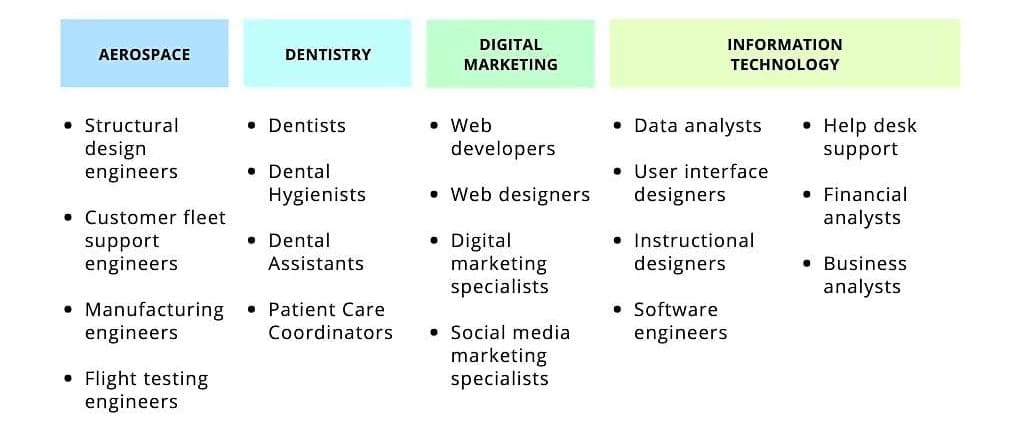Educating The Next Generation Of STEM Leaders: Six Perspectives From The Field

Introduction
Despite the rise in national attention to science, technology, engineering, and math (STEM) education, there is considerable uncertainty as to the best way to prepare your child for a STEM-oriented career at the K-12 level. Some educators point to mediocre U.S. mathematics literacy scores and suggest that schools teach a more rigorous mathematics curriculum, while others posit the importance of a well-rounded education.
With STEM jobs becoming an increasingly large part of our economy, it is important for parents and K-12 schools to find a way to prepare the next generation for science, technology, engineering, and math careers. A Burning Glass report found that there were 2.5 entry-level job postings for each new 4-year graduate in a STEM field. Meanwhile, the U.S. Bureau of Labor Statistics projects that STEM occupations will increase by 8.8% from 2018 levels by 2028, while non-STEM occupations will only increase 5%. These statistics suggest that there will be an even greater need to prepare students for STEM careers in the coming decade.
Clearly, not all STEM education takes place at the college level. A 2018 Pew Research Center analysis found that more than one third of the STEM workforce did not have a bachelor’s degree. Even if a child does pursue a higher level of education, they will begin with foundations built in primary and secondary school.
As such, it is important to ensure kids learn the foundational skills they will need for a STEM career during K-12 education. We set out to learn more about how parents can work with schools to prepare young students for future STEM success.
- “International Comparisons of Achievement.” National Center for Education Statistics, Institute of Education Sciences, 2020, nces.ed.gov/fastfacts/display.asp?id=1.
- “Real-Time Insight Into The Market For Entry-Level STEM Jobs and STEM Careers.” Burning Glass Technologies, Burning Glass Technologies, 2014, www.burning-glass.com/research-project/stem/.
- “Employment in STEM Occupations.” U.S. Bureau of Labor Statistics, U.S. Bureau of Labor Statistics, 15 Apr. 2020, www.bls.gov/emp/tables/stem-employment.htm.
- Graf, Nikki, et al. “7 Facts about the STEM Workforce.” Pew Research Center, Pew Research Center, 9 Jan. 2018, www.pewresearch.org/fact-tank/2018/01/09/7-facts-about-the-stem-workforce/.
Methodology
To gain a better understanding of how to help educate the next generation of STEM leaders, we surveyed six professionals in upper-mid to senior-level positions at organizations that hire STEM talent, and who have kids in high school and/or college:
- Rashi Narayanan, Engineering and Manufacturing Manager at Boeing
- Michelle Steinhubel, DDS, Dentist and Owner of All Smiles NW
- Adriana Buchanan, Lead Engineer at Boeing
- Marlon Buchanan, Sr. Director of Technology and Data Services at the University of Washington's Continuum College
- Shannon Zastrow, Chief Strategist and owner of digital marketing agency Rocketship LLC
- David Jackson, Engineering Leader at Boeing
STEM job positions at survey participants' organizations

We asked the survey participants qualitative questions about the following topics:
- The skills they valued when hiring and working with entry-level STEM professionals
- The challenges they faced in the search for qualified candidates
- How K-12 education impacted candidates’ job readiness
- How their organizations supported STEM education or training
- Patterns in STEM job preparation among local and non-local job candidates
- K-12 educational experiences, teachers, and extracurricular activities that prepared students for STEM careers
- How parents can assist in educating the next generation of STEM professionals
Each professional was an expert in their field with a front-line perspective on hiring or working with entry-level STEM professionals.
In addition to the above STEM professionals, we talked to two education professionals about their suggestions to help parents who have a budding young scientist or engineer. (Raine Sherwood, STEM/Project Lead The Way Teacher and Mary DeCracker, 8th Grade Science Teacher, both work with children every day at Northshore Christian Academy, a National Blue Ribbon Award-winning school in Everett, WA.)
What gaps or challenges should parents be aware of in the local STEM talent pool, related to your area of work?
Employers face a variety of challenges in the search for strong entry-level STEM candidates. We heard that many of today’s young jobseekers lack decent communication skills, solid data analysis and creation skills, foundational math skills, a strong work ethic, hands-on experiences like extracurricular activities, and the ability to bridge the gap between pre-built models and real-world scenarios.
Out of all of these challenges, the most common complaint was that entry-level STEM candidates lacked strong written and verbal communication skills. As a parent, you may want to take extra care to help your child develop these skills.
“In my industry, good writing skill is paramount. It seems harder and harder to find people, especially young or entry-level people who employ good grammar and style. There may be some underlying generational causes, like reliance on texting and voice activation, that have caused this generation to appear lazy grammatically and stylistically. Even for the more technical roles it’s important because there are still situations that require direct contact with a client, and these increase with level of responsibility. Poor communication is invariably a limiting factor for growth into more managerial and consultative roles. And it’s much easier to build that foundation in K-12 than attempt to fix bad habits later.”
~ Shannon Zastrow, consultant and owner of a digital marketing agency
What skills should parents emphasize to help their children qualify for entry-level STEM roles later on?

When we asked our survey participants which skills they valued in hiring for entry-level STEM roles, each of them emphasized the importance of soft skills like creativity, curiosity, problem solving, or emotional IQ. Some roles require specific technical skills, but even in these roles, your child is more likely to be hired if they combine a technical background with soft skills.
“I believe that when Boeing hires new engineers, they are looking for someone who is an effective communicator, works well on a team, and who is able to solve problems creatively and efficiently. If they have an engineering degree, they are likely technically sound, but these other intangible skills and critical thinking are what make someone stand out.”
~ Adriana Buchanan, Lead Engineer at Boeing
A 2019 Cengage/Morning Consult study found that the top three skills employers looked for were communication skills, attention to detail/attentiveness, and listening skills. If your child can demonstrate the ability to present technical information to non-technical people and communicate clearly in writing, they will stand out from their peers later on when they are searching for a job.
Employers also prioritize candidates with a strong math background and other technical knowledge related to the job position. However, encouraging your child to take STEM classes is not enough. There is an important difference between taking a technical course and possessing the mental discernment or resourcefulness required to put technical knowledge to use.
5. “New Survey: Demand for ‘Uniquely Human Skills’ Increases Even as Technology and Automation Replace Some Jobs.” Morning Consult, Cengage, 16 Jan. 2019, news.cengage.com/upskilling/new-survey-demand-for-uniquely-human-skills-increases-even-as-technology-and-automation-replace-some-jobs/.
You may want to encourage your child to get involved in real-world projects through extracurricular clubs and other opportunities. In addition to developing the kind of resourcefulness employers look for, real-world experiences may help your child get excited about STEM.
“It can be difficult to find candidates with the ability to bridge the gap between real world scenarios and pre-built models.”
~ Rashi Narayanan, Engineering and Manufacturing Manager at Boeing
You can also encourage your child to persevere through projects that require focus and a strong work ethic. These skills are important for success in STEM, as well as other careers.
What can parents encourage K-12 Schools to do differently or better to equip graduates for STEM careers?
As a parent, you may want to encourage your child’s school to spend more time on writing, reading comprehension, grammar, public speaking, and other communication skills. Many children growing up today would benefit from a stronger foundation in these skills, including those who intend to pursue STEM careers once they graduate.
If you are choosing a school, look for one that is already strong in these areas. Otherwise, you can work with teachers to optimize opportunities or work at home to fill in the gaps.
“I think it is worth pointing out that STEM roles don't exclusively employ STEM skill sets. They require soft skills as well as written and verbal communication. These are vital and it seems to me that schools may have over-emphasized STEM at the expense of these traditional skill sets, which ironically, hinders success even in STEM positions.”
~ Shannon Zastrow, consultant and owner, Rocketship (digital marketing agency)
It’s also a good idea to make sure your child learns basic financial literacy, how to analyze and interpret complex information, and how they might use class material in later years. While it may not seem directly related to STEM, financial challenges and literacy affect employee performance and are an important component of overall success, regardless of which career a child pursues.
One area that parents may not need to worry about as much at the K-12 level, is technical job skills training. Our survey participants did not recommend that K-12 schools teach more of the
6. Maurer, Roy. “Personal Financial Worries Plague Workers Worldwide.” The SHRM Blog, The Society for Human Resource Management, 2014, https://blog.shrm.org/workforce/personal-financial-worries-plague-workers-worldwide
skills currently taught in company training, instead emphasizing the importance of teaching foundational skills like math and communication.
“There are two areas I recommend here: First, teaching children how to learn systematic approaches to solving problems. In the early years, math should be taught with the focus of situational problem solving skills, and in later years students should be taught the questions to ask so they are led how to solve a problem or how to find a solution; Secondly, parents should encourage the learning of any form of public speaking which teaches children to relate to an audience. This should begin early in the classroom setting and expand to speaking events or classes such as debate as students age.”
~ Michelle Steinhubel, DDS, Dentist/Owner of All Smiles NW
What company-sponsored and extracurricular opportunities in STEM education should parents know about?

Many organizations support or encourage employees to volunteer in STEM outreach initiatives that parents can take advantage of. You may want to check out events sponsored by Women in Aviation, the Society of Mechanical Engineers, or National Engineers Week in partnership with Boeing and other local STEM employers.
You can also encourage your child to explore STEM through school-based robotics clubs, such as First Lego League or First Inspires. If your child is in middle school or high school, you may want to additionally explore opportunities for internships, tours, scholarships, and job shadowing.
Are there any patterns parents should be aware of in the preparation of students who are educated in Washington State compared with applicants from other parts of the country or world?
Based on our survey responses, Washington State parents don’t need to worry about their children being at a disadvantage. There does not appear to be any substantial difference between local and out-of-state or international job candidates.
However, two participants said that candidates from other parts of the country were sometimes preferred because they appeared to be more well-rounded, hard-working, or experienced in certain types of work than their local counterparts.
Hands-on experience is an important factor in hiring decisions, even for entry-level positions. Employers often prefer candidates who have been involved in relevant organizations or worked on personal projects. You can help your child qualify for future jobs with these employers by giving them opportunities for practical experiences outside of school, such as involvement in school STEM clubs or home science activities.
“Hands-on practical experience could be hobbies, it could be extracurricular activities. One time I was talking with the director of engineering at one of the premier automation companies in the United States, and he said he likes to hire young men and women from the Midwest who were raised on a farm. I will just tell you hands down, that's where I go to recruit: I want people who have hands-on, real-life experience.”
~ David Jackson, Engineering Leader at Boeing
Can you think of a teacher or educational experience that was pivotal in your pursuit of a STEM career?
Having good teachers made a difference in nearly all of our survey participants’ decisions to pursue their careers, and teachers may make a difference in your child’s decision too. If you are choosing a school for your child, you may want to look for one with well-trained, passionate teachers.
Two common themes came up in discussions of inspirational teachers: tying the course material to real-world examples and challenging students to do more. If teachers in your child’s school follow these practices, your child is sure to benefit.
“My high school chemistry and physics teacher, Mrs. Brunn, challenged me with her college style problem sets and labs. She linked the textbook topics with real life examples that made science interesting. She also set high expectations on how we behaved in her lab, and expected us to write and follow detailed procedures and take meticulous notes on what we observed. The challenge and experience made me feel like a real scientist, and I knew I wanted to pursue a technical career in college.”
~ Adriana Buchanan, Lead Engineer at Boeing
What one thing from your educational experience in K-12 helped uniquely prepare you for your career?
Some of our survey participants told us that access to up-to-date technology helped them prepare for their future careers. Others said that teachers who engaged them in assignments that appealed to their interests helped them develop relevant skills and motivation. If you are choosing a school for your child, you may want to ask about classroom technology usage and the kinds of assignments teachers assign.
“I benefited from the exposure to the latest technologies and teachers who were passionate about teaching.”
~ Rashi Narayanan, Engineering and Manufacturing Manager at Boeing
However, experiences in math and science classrooms were not the only experiences that were important. We were equally likely to hear about an after-school program like Science or Math Olympiads or a non-STEM activity.
As a parent, you can help your child prepare for their future career by encouraging them to explore any extracurricular activities they are interested in. Many kinds of activities can develop the soft skills needed to succeed in the workplace of today and tomorrow.
“I think debate was a great help in my ability to analyze and communicate information. I participated and competed in cross examination debate and original oratory for years, and learned skills I still use today when I deal with people and try to influence and explain things.”
~ Marlon Buchanan, Sr. Director of Technology and Data Services at the University of Washington's Continuum College
What educational advice would you give to parents who think they have a budding young scientist or engineer?

Our survey participants suggested that you encourage your child to explore their interests, whether in extracurricular activities or at home. Some emphasized STEM clubs such as robotics or technology teams, while others recommended giving children opportunities to explore a range of STEM and non-STEM opportunities. One takeaway is clear: the most beneficial activities are the ones your child is most interested in.
You can also expose your child to a variety of real-world experiences in their fields of interest and encourage any self-driven projects they take on. Curiosity will not only help your child learn and grow, but also help them get a foot in the door later on.
“I think choosing a school that provides a broad range of opportunities is essential, especially in elementary and junior high school. My kids are in high school, and looking back, it's easy to see how their interests and desires changed dramatically over the years. The best thing I can do is provide opportunities for my kids to experience new things, and let them find out what inspires and motivates them.”
~ Shannon Zastrow, consultant and owner, Rocketship (digital marketing agency)
“Encourage your kids’ curiosity and never take their ‘silly’ questions for granted. Try to use judgement as to why they are asking the question to satisfy their intellectual curiosity.”
~ Rashi Narayanan, Engineering and Manufacturing Manager at Boeing
We also asked two local teachers for their perspective on how parents could help educate the next generation of STEM leaders. We heard similar advice about encouraging your child’s creativity, as well as suggestions to engage your child in conversation about STEM topics and careers.
“Ask them, ‘How do you think that happens or works?’ This question, albeit simple, opens up the opportunity to engage in thought. Engaging ‘how’ allows students the opportunity to create scenarios in their heads. This creation encourages excitement and ‘I wonder if’ moments!”
~ MaryDeCracker, Middle School Science Teacher at Northshore Christian Academy
“I would say to be genuinely excited for what makes them excited. In this age of YouTube, digital everything, and screen time, try to get away from those and let them really be hands on with the things that make their eyes light up. Make connections with other parents who have careers in those fields. Tell your child how their natural skills would be great at different careers: ‘I see you are so organized, that is a great skill. Engineers have to be organized when they… Doctors have to be organized when they....’ My daughter is very into science; she is constantly mixing things to find out what happens. She's curious. We can replace her carpet (and the drain, and refinish her dresser), but it's hard to reignite a flame that has gone out, so we let her experiment, with boundaries of course.”
~ Change attribution to: Raine Sherwood, STEM/Project Lead The Way Teacher and recipient of University of Washington’s “Extra Yard for Teachers” award for excellence in STEM education.
Can you think of any outside-the-classroom experiences that parents could foster for their kids that would be beneficial, especially in educational settings where STEM offerings may be limited?
There are many ways to grow your child’s interest in STEM fields. Several of our survey participants suggested enrolling kids in after-school STEM activities, such as a robotics or science club. Even broad organizations like 4-H often have numerous STEM opportunities for children.
“I believe that parents should set an example here by answering their child's questions proactively. You might answer a question with, "I don't know, but let's look that up right now" using online resources or take the child to the library to find the answers. Playing some of the newer board games that are word-based and more team cooperative is great and available for various ages. As kids get older, parents can be intentional by encouraging them to practice skills in public settings, such as ordering for themselves in a restaurant, and interacting with others like asking for assistance in a store.”
~ Michelle Steinhubel, DDS, Dentist/Owner of All Smiles NW
If these types of activities are not available, you can still find STEM-related summer camps, internet resources, and science kits. You can also make an effort to take your child to science museums and national park educational centers.
“If a science club or First Lego League Robotics isn't available at their child's school, I encourage parents to sign them up for summer STEM camps and also consider organizations such as Boy Scouts and Girl Scouts who incorporate STEM into their weekly meetings. There are many resources on the internet and science or engineering kits to get children interested in science and technology. The STEM activity doesn't have to be school-organized or expensive for a child to learn and have fun doing it; oftentimes, you have all the materials you need already in your home.”
~ Adriana Buchanan, Lead Engineer at Boeing
Girl Scouts and Boy Scouts were brought up by many of our respondents. One of the great things about scouting is that it is widely accessible in many communities, so it seems particularly relevant for situations where STEM offerings are limited in school. But even in strong STEM schools, scouting offers something above and beyond the classroom. Both Boy Scouts and Girls Scouts, for example, seek to build character while providing hands-on experience with merit badges in all kinds of activities, including STEM and innovations. Pinewood Derby, which is often run by local chapters of Boy Scouts or Cub Scouts, is an amazing activity that has brought parents and kids together to learn about physics. And Eagle Scouts or Girl Scouts’ Gold Award looks great on a resume because it shows consistent teamwork and commitment.
Key Findings
STEM jobs require more than just the technical knowledge taught in traditional STEM courses. A primary challenge for STEM hiring managers is finding well-rounded candidates who demonstrate soft skills, particularly communication and creative problem-solving. To truly prepare for success in STEM, students must develop competency in writing, verbal communication, creativity, and additional skills that are primarily taught outside of STEM classrooms.
Within the technical STEM skillset, job candidates are most likely to lack adequate math and data analysis skills. It appears that math education remains a key gap in students’ preparation for STEM careers. In addition to focusing more on math fundamentals, STEM teachers can link course materials to real-world examples and maintain students’ interest in what they are learning.
Students also benefit significantly from non-classroom activities such as school clubs and practical experiences at home. Communication skills, curiosity, resourcefulness, and positive attitudes toward learning can be refined both inside and outside the classroom.
Recommendations for Parents
Parents should encourage students to participate in extracurricular activities that appeal to their interests, including those that are not directly related to STEM. As one of our participants keenly noted, engineering (as well as other STEM roles) is all about creative problem solving. Activities like debate teams and robotics clubs allow students to develop skills and mindsets that will help them achieve future career success.
In addition to any after-school activities available at the child’s school, parents can seek out community organizations that provide opportunities for STEM learning, such as:
- Boy Scouts or Girl Scouts
- 4-H
- YMCA
- Big Brothers Big Sisters
- Technology Student Association
- Add more options here? See my list via email...
STEM at Home
Finally, in the era of quarantine and distance learning, home science projects and experiments can be just the thing to engage bored kids in more productive activities than TV and video games. Check out these websites for some fun weekend experiments:
- NASA Kids Club
- Girls Who Code
- BrianPOP Science
- Science Kids
- National Girls Collaborative Project
- National Geographic Kids
- How Stuff Works
- EngineerGirl
- 4-H Stem Lab
- Bill Nye
- Exploratorium
- Alexa Cafe
Choosing a School for Your Child's STEM Education
If you are considering different schools for your child, we recommend that you choose a school that emphasizes foundational math and communication skills development and offers plenty of opportunities for students to explore their interests with hands-on activities. Parents who are looking at different schools can ask questions like the following:
- What does this school do to emphasize math, reading, writing, and public speaking skills? Do students test well in math and English?
- What is the pervasive teaching philosophy? Do students have many opportunities to work on real-life projects and see how the subject matter applies to the real world?
- Do the teachers seem passionate about their work?
- What opportunities are available for students to explore their interests, both within STEM fields and beyond? Are there any STEM-related after-school clubs, competitions, or engineering activities?
- What kinds of technology do students and teachers use in the classroom?
- What kinds of projects do students work on in the classroom?
Regardless of which school your child attends, there are plenty of opportunities to encourage an interest in STEM and help your child prepare for their future career. Robotics clubs, museum visits, math competitions, and other activities can spark a lifelong interest and help children develop the skills for future success.
Recent Posts
Explore categories
Visit NCA:
Request a Tour Today!
Northshore Christian Academy is known for more than just our amazing curriculum, we also have one of the most incredible private school campuses in Washington State. See it for yourself.


%201.png?width=1286&height=371&name=logo-30th-anniversary%20(1)%201.png)





